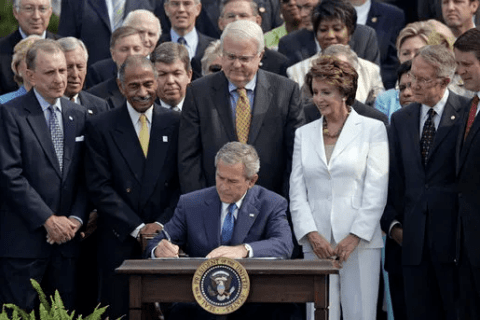
Nationwide debates regarding the Voting Rights Act returned in 1992, as the linguistic requirements drew closer to expiration. The first piece of legislation introduced to address the expiration was the Voting Rights Language Assistance Act of 1992. Developed by Representative José E. Serrano (D-NY), the legislation proposed expanding the coverage formula and the bilingual election requirement, so as to cover jurisdictions with linguistic minority populations of over 10,000. A new proposed addition was the creation of a completely new coverage formula for linguistic minorities among Indigenous peoples living on reservations. All these provisions were also designed to last for 15 years, so that they would be set to expire at the same rate as the previous provisions of 1982. In spite of an overall lack of intensity in Congressional hearings, Serrano’s provisions were met with opposition largely by Republicans, on the grounds that linguistic provisions were either unnecessary or unconstitutional. Those who supported the provisions mentioned that by not including multilingual accommodations in the VRA, newly-naturalized citizens would struggle with adapting to the electoral system. Attempts to oppose the legislation all failed, leading to its majority Democratic-supported passage. On August 26, then-President George H.W. Bush signed the Voting Rights Act Amendments of 1992 into law.
When the VRA’s special provisions drew closer to expiration again, Congress reconvened to discuss the legislation in 2006. The Democrats, with the support of several civil rights organizations, approved the renewal and expansion of the provisions. Conversely, the Republicans near-universally opposed further renewals or expansions of the VRA. Specific reasons for their opposition varied among the Republicans in Congress. Some believed that Section 5’s “preclearance” clause went against the rights of the individual states. Others felt that the constant renewals of the VRA opposed the notion of “color-blindness,” that being the concept of conducting Congressional affairs without any considerations towards race, ethnicity, or national origin. In spite of the partisan divide, several Republicans admitted that the special provisions benefited both sides of the political spectrum in certain cases, so a bilateral agreement to renew the VRA was made far sooner than in previous years.
As was the case with the previous VRA additions, Congress called for witnesses across the country to report any instances of ongoing voter discrimination. In addition to the need for testimony towards discriminatory actions, certain members of Congress also believed that the effectiveness of laws – including the VRA provisions – needed to be measurable and provable in protecting Constitutional law, as it was determined in City of Boerne v. Flores (1997). In a country that had made major strides in social and fiscal progress since the original VRA in 1965, the Congress of 2006 knew that in order to justify renewing the VRA provisions, the effectiveness of the laws needed to be proven, but not so far as for people to think that they would no longer be necessary in modern American society.
In May 2006, Representative Jim Sensenbrenner (R-WI) proposed a bipartisan version of the VRA provision renewals. It was designed to extend the provisions for 25 more years, maintain the current coverage formula, and would overturn the Supreme Court cases of Reno v. Bossier Parish School Board (2000) and Georgia v. Ashcroft (2003), both of which were seen as attempts to weaken Section 5 of the VRA. Although three counter-amendments were formed by dissenting Republicans in Congress, Sensenbrenner’s bill was passed by the House of Representatives by a 390-33 vote in June. After passing the Senate on July 20, the bill was signed into law by then-President George W. Bush on July 27, with Rosa Parks, Al Sharpton, Jesse Jackson, and the surviving family members of Martin Luther King Jr. in attendance.